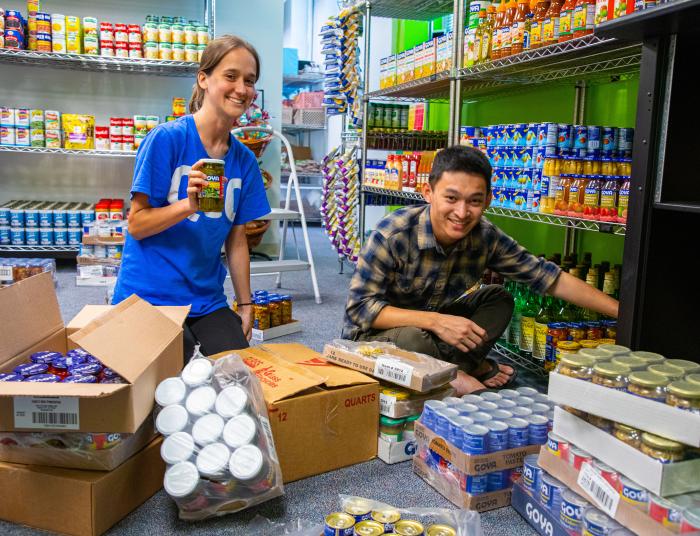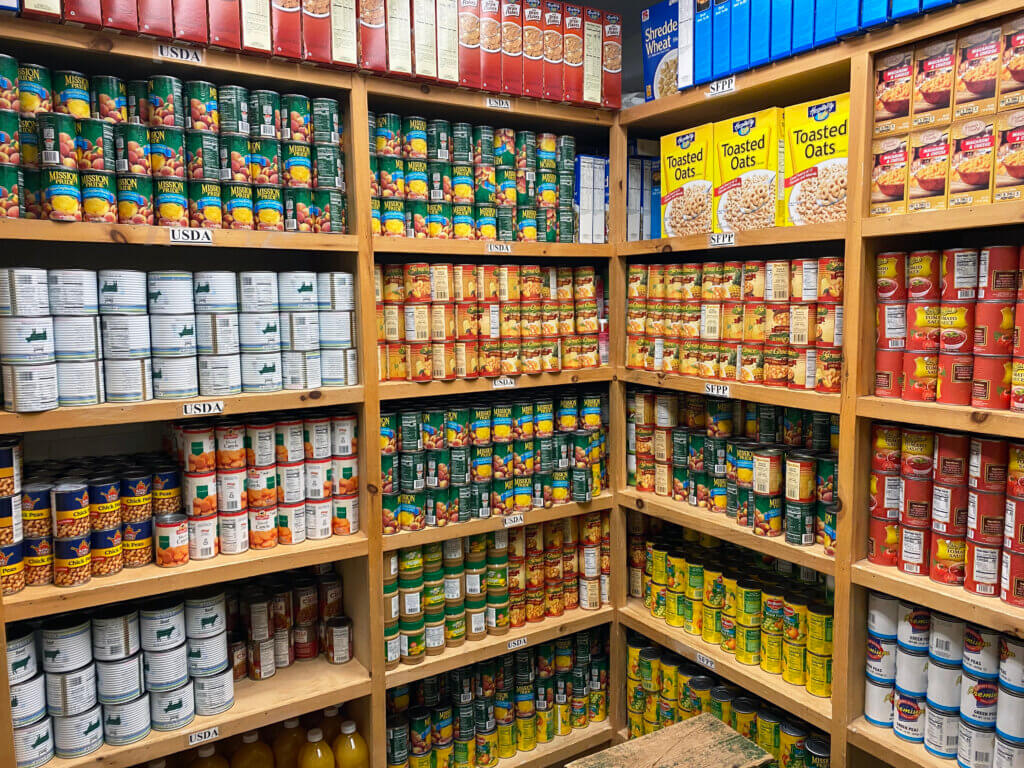Why Sustaining Your Regional Food Kitchen Is Essential for Aiding Those in Need
The relevance of sustaining regional food kitchens can not be overstated, especially in the context of food insecurity, which impacts a worrying number of individuals and families within our areas. These necessary resources not only give instant relief from appetite but additionally add to wider societal advantages, including enhanced health and academic end results. As we explore the complex function of food pantries, it ends up being evident that their impact expands far past just dispersing food (Food Pantry Lockhart). Recognizing this much deeper connection might trigger a reconsideration of exactly how we involve with and support these essential organizations.
Understanding Food Instability
Food instability affects roughly 10.5% of households in the USA, highlighting a significant public health and wellness concern that transcends simple appetite. It describes the lack of consistent access to sufficient food for an energetic, healthy and balanced life. This problem can bring about a variety of unfavorable outcomes, including poor wellness, raised healthcare expenses, and reduced scholastic efficiency amongst kids.
The reasons for food instability are diverse, frequently originating from economic factors such as destitution, underemployment, and joblessness. Geographic area can likewise play an important function, with food deserts-- locations with restricted access to nourishing and inexpensive food-- intensifying the problem - Food Pantry Lockhart. Additionally, systemic elements, consisting of racial and social inequities, add to the out of proportion influence of food insecurity on marginalized communities
Addressing food insecurity is not merely about raising food supply; it requires an extensive method that includes economic security, education, and neighborhood support. Food insecurity not only impacts individual wellness but also has wider ramifications for social health and efficiency. Recognizing its complexity is important for developing reliable interventions and promoting long-lasting services that make sure all people have reputable accessibility to nourishing food.
The Duty of Food Pantries
Neighborhood food kitchens work as important lifelines for family members and individuals facing food instability. They provide essential food things to those who might battle to manage appropriate nourishment as a result of economic difficulty, unemployment, or unpredicted scenarios. By dispersing food at no cost, these companies aid minimize appetite and avoid the negative health and wellness effects related to insufficient diet plans.
Food pantries typically partner with neighborhood farms, grocery stores, and area organizations to source a variety of nourishing food items, including fresh fruit and vegetables, dairy, and proteins. This collaboration makes sure that pantry clients obtain not only nutrition yet likewise healthier choices that add to general well-being.
Additionally, food cupboards function as neighborhood hubs, fostering connections amongst residents and giving a feeling of dignity to those in requirement. Numerous pantries provide extra sources, such as nutrition education and references to social services, aiding clients navigate their difficulties better.
Fundamentally, food cupboards play a multifaceted duty in combating food insecurity. They not just address immediate cravings however additionally encourage families and individuals to enhance their scenarios, consequently advertising community resilience and communication.

Advantages of Supporting Food Pantries

Supporting food pantries not just nurtures those in demand yet also enhances the material of the neighborhood. By offering important food resources, food kitchens ease cravings and lower food instability, which is crucial for the health and health of people and families. Accessibility to nourishing food adds to enhanced physical health and wellness, much better academic outcomes for children, and improved mental health, thus cultivating a much more efficient and involved area.
Moreover, sustaining food kitchens advertises social cohesion. These organizations offer as hubs for community interaction, combining volunteers, donors, and receivers in a common mission to fight appetite. This partnership can damage down obstacles, foster understanding, and develop relationships amongst varied area members.
Furthermore, donations to food pantries, whether in the type of food, funds, or time, boost the neighborhood economy. Lots of food cupboards visit this page focus on sourcing from neighborhood producers, therefore supporting neighborhood farming and companies. This produces a cycle of assistance that profits not only those in need however the neighborhood all at once.
Exactly How to Obtain Entailed
Interaction with food pantries can take many types, allowing groups and people to make a meaningful effect in their communities. Monetary contributions are also indispensable, as they enable food kitchens to buy fresh fruit and vegetables and crucial products.
Volunteering your time is an additional impactful way to support local food cupboards. Many organizations rely upon volunteers for arranging, packaging, and dispersing food. This hands-on involvement not only assists the kitchen however also cultivates a sense of community. In enhancement, take into consideration arranging food drives within your institution, office, or area group to raise awareness and collect resources.
Partnerships with neighborhood businesses can better boost support for food pantries. By taking these actions, people and groups can dramatically reinforce the initiatives of neighborhood food pantries and aid those in need.
Area Impact and Link
Recognizing the extensive impact of food kitchens on neighborhood wellness is vital for promoting a spirit of connection and partnership. Food cupboards serve not only as important resources for those facing food insecurity however likewise as centers for neighborhood interaction. They bring together use this link diverse groups-- customers, volunteers, and donors-- developing an atmosphere where individuals can sustain and link one another.
The influence of food cupboards prolongs beyond plain provision of food; they serve as a driver for social communication. By getting involved in cupboard initiatives, community members can develop relationships that transcend socioeconomic barriers. This network of support helps to take down the preconception typically connected with food aid, fostering an ambience of approval and understanding.
As individuals unify in their initiatives to sustain local food cupboards, they cultivate a feeling of shared function and obligation, enhancing the concept that everyone has a function to play in ensuring that no one goes hungry. Ultimately, sustaining food pantries enhances the fabric of the community as a whole.
Final Thought
Sustaining neighborhood food cupboards is necessary in combating food insecurity and enhancing the wellness of susceptible populations. Interaction with food kitchens promotes area links, promoting social communication and equity.
